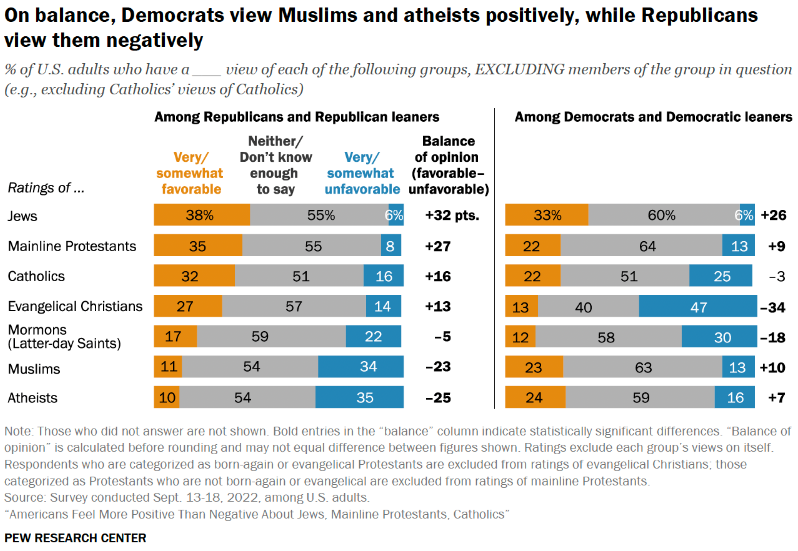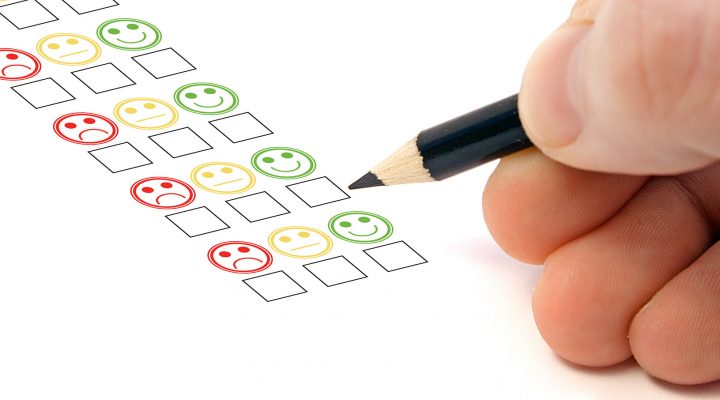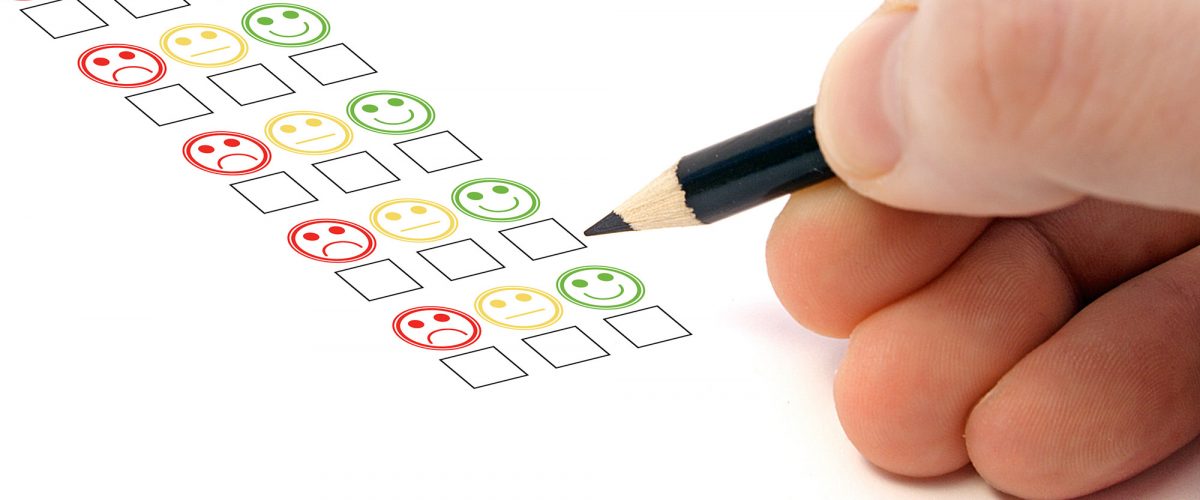Despite ongoing spikes in antisemitism corresponding to the rise of white supremacy and Christian nationalism, most Americans think more highly of Jews than they do of evangelical Christians, Mormons, Muslims and atheists, according to a new survey by Pew Research Center.
“On the whole, 35% of Americans express very or somewhat favorable attitudes toward Jews, while 6% express unfavorable attitudes,” according to poll results released March 15.
These findings come amid a wave of antisemitism in U.S. culture and beyond, including high-profile tropes by celebrities such as Ye, formerly known as Kanye West, threats of violence against synagogues during last month’s neo-Nazi “day of hate” and the increased use of propaganda by white supremacist and Christian nationalist organizations nationwide.
“Among all the religious groups asked about, only Jews universally receive net positive ratings from all other groups,” Pew researchers said. “While 81% of Jews rate their own group favorably, Christians across various subgroups also rate Jews much more favorably than unfavorably. For example, 45% of Protestants who describe themselves as born-again or evangelical view Jews favorably, compared with 6% who have an unfavorable view toward Jews.”
Mainline Protestants (30%) and Catholics (34%) were trailed by atheists (20%), Muslims (17%) and Mormons (15%).
Evangelical Christians received some of the lowest ratings from U.S. adults: “Overall, similar shares of the whole public say they view evangelical Christians favorably (28%) and unfavorably (27%). But among Americans who are not themselves born-again or evangelical Protestants, the balance of opinion is much more negative (32% unfavorable vs. 18% favorable). Some of this sentiment is tied up with politics: Democrats who are not born-again or evangelical Protestants are far more likely than non-evangelical Republicans to view evangelicals negatively (47% vs. 14%, respectively).”

Pew found most American adults tend to hold favorable opinions about religious groups when they know someone from those traditions.
“For example, about four in 10 non-Jews who know a Jewish person (42%) express positive views of Jews, double the share among non-Jews who do not personally know someone in this religious group (21%),” the report said. “However, the share of non-Jews who express a negative view toward Jews is similar regardless of whether they know someone who is Jewish or do not (6% and 7%, respectively).”
Respondents who said they know a mainline Protestant were roughly three times more likely to rate that group positively, while those who know Muslims were “slightly more likely to express a favorable (24%) rather than an unfavorable (21%) view of Muslims.”
But the pattern didn’t quite apply to evangelical Christians, Pew pollsters said.
“The balance of opinion toward evangelical Christians is negative both among those who know someone who is an evangelical Christian (-11 percentage points) and among those who do not (-19 points). While those who know an evangelical Christian are more likely than those who do not to express a positive view of the group (24% vs. 9%), they are also slightly more likely than those who do not personally know an evangelical Christian to express a negative view of evangelicals (35% vs. 29%).”
Evangelicals aren’t alone in this trend, the survey found. “This same pattern applies to Mormons: Non-Mormons who know someone who is Mormon not only are more likely than those who don’t to express a favorable view toward Mormons (19% vs. 10%), but also are more likely to express an unfavorable view (31% vs. 22%).”
The survey also found that respondents usually rated their own faith groups highly, with the leading being 81% of Jews, 80% of Mormons, 72% of atheists and 66% of Catholics.
“Most Protestants who describe themselves as ‘born-again or evangelical Christians’ (60%) say they have a favorable view of evangelical Christians. Among Protestants who are not born-again or evangelical, 42% express a favorable view of mainline Protestants.”
Researchers also detected a tendency among some respondents to resist rating entire religious groups altogether.
Researchers also detected a tendency among some respondents to resist rating entire religious groups altogether, which led to most giving neutral responses to questions.
“For example, about six in 10 U.S. adults (59%) say they hold ‘neither favorable nor unfavorable’ views of Muslims or ‘don’t know enough to say,’ while 17% express very or somewhat favorable views of Muslims and 22% express very or somewhat unfavorable views of the group.”
Pew’s researchers said they noticed this trend was affected by the size of the faith groups asked about because respondents typically rated their own traditions in positive terms.
“Looking at the data this way, it is clear that non-Catholic Americans have a net positive view of Catholics. But there is a big difference between the way evangelical Christians are rated by the whole public (including roughly one-quarter of U.S. adults who describe themselves as born-again or evangelical Protestants) and the way they are rated by people who are not evangelicals.”
The survey documented notable differences when responses were broken down by party affiliation.
“Republicans and GOP leaners hold, on balance, more favorable than unfavorable views of evangelical Christians and Catholics,” the Pew report said. “By contrast, Democrats and Democratic leaners view evangelicals much more negatively than positively and are as likely to view Catholics unfavorably as favorably. On balance, both Republicans and Democrats view Mormons negatively, although the margin is wider among Democrats (18 percentage points) than Republicans (5 points).”
Democrats (33%) and Republicans (38%) consider Jews favorably, Pew said.
“But there are much bigger partisan gaps in views toward other non-Christians. Republicans are more likely to express negative than positive sentiments toward atheists and Muslims, while the reverse is true of Democrats, who are more favorable than unfavorable toward these groups. Both atheists and Muslims lean heavily Democratic, although the same is true of Jews.”
Related articles:
Three hate groups drove spike in antisemitism and racist propaganda last year


